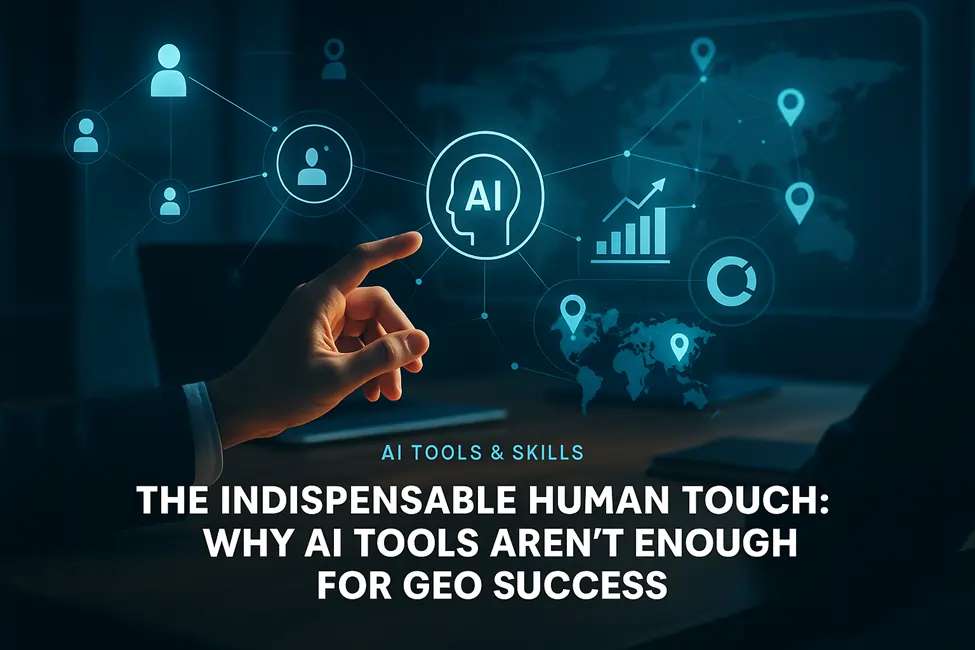The Indispensable Human Touch: Why AI Tools Aren't Enough for GEO Success AI Tools & Skills

The AI Gold Rush: A Powerful Tool, Not a Magic Bullet
In the bustling digital marketplace of India, the buzz around Artificial Intelligence is impossible to ignore. AI-powered tools like ChatGPT and Jasper are being hailed as game-changers, promising to write blog posts, social media updates, and marketing emails in seconds. For busy entrepreneurs and marketing teams, this sounds like a dream come true—a way to create massive amounts of content with minimal effort.
This new reality has given rise to Generative Engine Optimization (GEO), a strategy focused on making your brand the go-to source for AI-powered search engines like Google's AI Overviews and other conversational platforms. The goal is no longer just to rank on a results page, but to be the authority whose information is directly used and cited in the answers AI provides.
However, this AI gold rush comes with a critical warning: while these tools are potent for increasing efficiency, they are not a replacement for human intelligence, creativity, and strategic thinking. Relying solely on AI for your GEO strategy is like constructing a house with a super-fast nail gun but no architect's blueprint. You’ll make something quickly, but it will lack structure, integrity, and the thoughtful design needed to stand the test of time.
At Public Media Solution, we believe in leveraging the best of technology, but we know that true, sustainable success in the GEO era comes from a powerful partnership: the speed of AI combined with the indispensable human touch.
Where AI Shines: The Power of Automation and Data Analysis
It's important to acknowledge what AI tools do exceptionally well. They are masters of speed and data processing, offering significant advantages for any marketing team.
- Unmatched Speed and Efficiency: An AI tool can generate a first draft of an article, a list of topic ideas, or social media captions in a fraction of the time it would take a human. This frees up marketing teams from the drudgery of starting with a blank page, allowing them to focus on more strategic tasks.
- Data-Driven Insights: AI can analyse massive datasets to identify trending topics, suggest relevant keywords, and provide insights into what content resonates with your audience. This helps in making more informed decisions about your content strategy.
- Content Scalability: For businesses needing to produce a large volume of content, such as development descriptions or simple FAQ answers, AI can maintain a consistent structure and tone, helping to scale efforts quickly.
These capabilities make AI an incredible assistant. It can handle the repetitive, time-consuming tasks, allowing human experts to focus on higher-value work. But an associate is not a strategist, and this is where the limitations of AI become critical.
The "Black Box" Problem: Critical Limitations of AI in GEO
For all their power, AI tools have fundamental flaws that can undermine a brand's credibility and render a GEO strategy ineffective. These are not minor issues; they are significant risks that require human oversight.
Lack of True Creativity and Emotional Intelligence
Marketing that truly bonds with people is built on emotion, storytelling, and cultural understanding. AI, however, operates on algorithms and data patterns, not genuine human experience. It cannot replicate the essential human elements that build brand loyalty:
- Empathy and Emotion: AI can't feel empathy or understand the subtle emotional triggers that make a story exciting. Content that lacks this emotional depth will fail to connect with audiences on a personal level.
- Humour and Cultural Nuance: AI struggles with humour, sarcasm, and the rich cultural nuances that make content relatable, especially in a diverse market like India. A joke that lands nicely in Delhi might be lost on an audience in Chennai, a distinction AI is not equipped to make.
- True Originality: AI doesn't create; it remixes. It generates content based on the vast dataset it was trained on. This means it often produces generic, repetitive language that looks and sounds like what's already out there, making it difficult for a brand to stand out.
The Risk of "AI Hallucinations" and Inaccuracy
One of the most dangerous flaws of AI is its tendency to "hallucinate"—a polite term for making things up. AI models can generate statistics, quotes, or "facts" that are entirely false but presented with absolute confidence. For businesses, especially those in "Your Money or Your Life" (YMYL) sectors like healthcare and finance, publishing inaccurate information is not just embarrassing; it can be a legal and reputational disaster. This directly undermines the "Trustworthiness" that is central to both customer relationships and GEO success.
Inability to Capture a Unique Brand Voice
Your brand voice is your personality; it's what makes you recognisable and different from your competitors. AI tools struggle to consistently capture and convey a unique brand voice without extensive human editing. The output is often generic and may not align with your company's tone, messaging, or core values, diluting your brand identity over time.
The Transparency and Attribution Gap
Many AI models work as a "black box," meaning it's not clear how they arrive at an answer or which sources they used. They often synthesise knowledge from multiple places without providing proper attribution or links, making it difficult to measure the ROI of your scope efforts. Furthermore, the answers generated by AI can be inconsistent, with the same prompt yielding different results at different times, making it nearly impossible to reliably track your brand's visibility.
The Human Strategist: Why Expertise and Judgment are Irreplaceable
While AI is a tool for execution, the process, oversight, and deep understanding required for GEO success remain firmly in the human domain. Technology can't replicate the wisdom that comes from experience.
Strategic Thinking and Contextual Understanding
A successful GEO strategy requires more than just well-structured content. It demands a deep understanding of the business's goals, the competitive geography, and the target audience's needs. A human strategist can ask the critical questions AI can't:
- What are our core business purposes, and how does this content support them?
- How does this piece of content fit into the customer's overall journey?
- What is our competition doing, and how can we create a unique angle?
This high-level, strategic thinking is what turns content from a simple commodity into a valuable business asset.
Building E-E-A-T: The Human-Only Domain
Google's E-E-A-T (Experience, Expertise, Authoritativeness, Trustworthiness) framework is the gold standard for content quality, and it's more important than ever in the age of AI. While AI can mimic expertise, it can never have genuine, first-hand Experience. This is a uniquely human attribute.
- Experience: AI cannot share a personal story, a real-world case study, or a hands-on review of a product. This is the kind of content that builds deep trust with both users and AI engines, and it can only come from real people.
- Expertise and Authority: Demonstrating actual expertise requires more than just facts. It involves showcasing the credentials of your authors, citing original research, and earning mentions from other reputable sources—all tasks that require human effort and relationship-building.
- Trustworthiness: Trust is built through transparency. Having clear author bios, an "About Us" page that tells your company's story, and citing credible sources are all human-led actions that signal to AI that your content is reliable.
Navigating Cultural Nuances for the Indian Market
India is not a single, uniform market. It is a vibrant mosaic of languages, cultures, and regional behaviours. A marketing message that resonates in a metro city like Mumbai may be completely ineffective in a Tier-2 town in Uttar Pradesh. Only human marketers can:
- Understand the local dialects, traditions, and festivals that can make a campaign truly connect.
- Recognise the different needs and purchasing habits of consumers in other regions.
- Build relationships with local influencers and media, a key part of a strong digital PR strategy that fuels GEO.
AI, with its global dataset, lacks this granular, localised understanding. Without a human touch, a brand risks appearing tone-deaf and disconnected from the very customers it's trying to reach.
The Winning Formula: A Human-AI Collaboration
The debate shouldn't be "AI vs. Human." The most successful businesses will be those that dominate the art of "AI + Human". By combining the powers of both, you can create a GEO strategy that is both efficient and highly effective.
Using AI as an Intelligent Assistant, Not a Creator
Think of AI as the world's most capable intern. It's there to support your expert team, not to lead them. Here's how to strike the right balance:
- Use AI for: Brainstorming topic ideas, creating initial drafts, summarising research, and analysing performance data.
- Rely on Humans for: Setting the overall strategy, fact-checking all AI-generated content, injecting brand voice and emotion, adding personal experiences (E-E-A-T), and ensuring cultural relevance.
A Practical Workflow for Indian Businesses
- Human-Led Strategy: Your marketing experts define the goals, research the target audience (including local nuances), and create the content strategy.
- AI-Assisted Creation: Use AI tools to generate outlines and first drafts based on the human-defined strategy.
- Human-Powered Refinement: This is the most critical step. Your team of writers, editors, and subject matter experts review, edit, and enrich the AI draft. They fact-check every claim, add real-world examples, ensure the brand voice is perfect, and optimise the content for the specific local audience.
- Human-Driven Distribution and Authority Building: Your team focuses on digital PR, building relationships with local media, and managing your brand's reputation across online forums and review sites—activities that build the authority signals AI engines look for.
Your Greatest Asset in the AI Era Is Still Human
The rise of AI is not a threat to quality marketing; it's an opportunity to elevate it. By automating the mundane, AI frees us to focus on what truly matters: strategy, creativity, and building genuine connections with customers.
In the new landscape of Generative Engine Optimization, technology is a powerful enabler, but it is not the solution. Your brand's unique stories, your team's deep expertise, and your original understanding of the Indian market are your most valuable assets. These are the human elements that AI can never replicate, and they are the keys to building a brand that is not only seen by AI but trusted by people.
Share
Table Of Contents
- The AI Gold Rush: A Powerful Tool, Not a Magic Bullet
- Where AI Shines: The Power of Automation and Data Analysis
- The "Black Box" Problem: Critical Limitations of AI in GEO
- The Human Strategist: Why Expertise and Judgment are Irreplaceable
- The Winning Formula: A Human-AI Collaboration
- Your Greatest Asset in the AI Era Is Still Human
